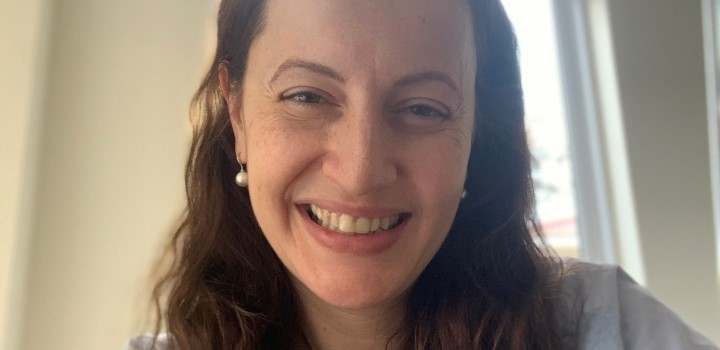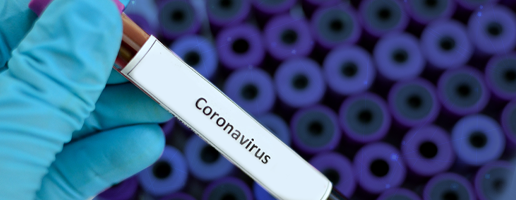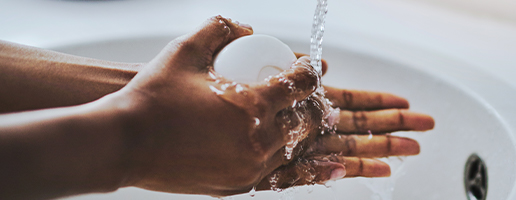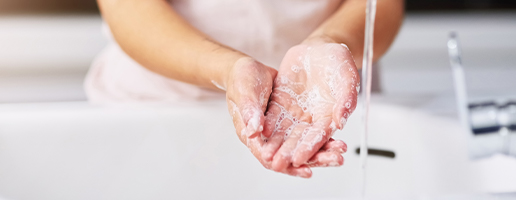Listen (podcast): Dr Despina Demopoulos describes the reality of preparing for the peak of COVID-19

Azania Mosaka recently spoke to Dr Despina Demopoulos, a paediatric intensivist at the Wits Donald Gordon Medical Centre and Discovery Foundation Awards alumna, about the reality of preparing for the peak of the COVID-19 pandemic in South Africa.
LISTEN TO Dr Demopoulos’ podcast – a part of the Discover COVID-19 podcast series. You will also find this and many other podcasts on our COVID-19 podcast hub.
Childhood critical care specialist on the front line
Dr Demopoulos wears many hats. She takes care of critically ill children in the intensive care unit (ICU) and high-care unit at Wits Donald Gordon Medical Centre, and serves on various COVID-19 task teams and ethics committees. She’s also the secretary of the South African Paediatric Society, a wife, and a mother of two boys age nine and three.
“COVID-19 has changed the way we are able to manage our patients,” she says. “Fortunately for us and for the world, children haven’t been as critically ill [with COVID-19] as adults have, so we don’t currently have very ill kids in the ICU, but every patient that comes in, we worry about it.”
“I also work in an ICU with adults and we have a lot of immunocompromised patients, transplant patients, oncology patients,” she adds. “So, we definitely have the patients that are at very high risk of getting COVID-19 and so there’s a lot of extra anxiety and worry every day.”
How healthcare facilities are getting ready for COVID-19
“We’ve cut down on a lot of surgeries, we’re only allowing emergencies,” she explains. “We’re preparing for this pandemic. We’re making provisions of COVID-19 wards and COVID-19 ICUs.”
She says most healthcare facilities are preparing for the peak of COVID-19. “Everyone is trying to do their part.”
“We’re screening every single person that’s coming in,” she adds. “It’s definitely affected the way we practice, and it’s also caused a lot of anxiety and stress on the staff that work in the hospital.”
- LISTEN TO Alec Hogg’s interview with Dr Demopoulos for the Inside COVID-19 BizNews podcast in partnership with Discovery. Her interview starts at 45 min 50 sec into the podcast.
Calm before the storm
“This is just the calm before the storm,” Dr Demopoulos says. “We’re hoping that it won’t be as bad as it’s been in a lot of overseas countries but with South Africa’s socioeconomic status, HIV, TB, and malnutrition, we don’t know how it’s going to affect us here compared to the rest of the world … We believe that the peak is still coming.”
Running out of personal protective equipment (PPE) is a big concern in public healthcare facilities. “We do know that there’s a limited amount,” she says. “I have a lot of colleagues in the state sector that have been very worried that they are going to run out of PPE.”
Doctors lose sleep over triage decisions
Dr Demopoulos says sorting patients by priority for treatment, evacuation or transport is causing her and her colleagues much anxiety. “You’re making decisions with people’s lives,” she says.
She explains that although triage decisions are made in teams of doctors, it doesn’t make it any easier.
“We’ve had to put our wills in order”
Dr Demopoulos shares how her work affects her personal life. “At home, it is difficult for myself and for many of my colleagues that have families, because we don’t worry so much about ourselves, we worry about spreading it to our families and our loved ones,” she says.
“When I come home, I’ll shower outside and my kids are not allowed to come and hug me. They’ll stand at the garage and wave. Then I’ll soak my scrubs in very hot water and soap, spray my keys, spray my car … it’s a whole regimen before I can come inside,” she shares.
Dr Demopoulos thinks to the future. “If I do get COVID-19 … I’ll probably isolate by myself somewhere and a lot of doctors are doing that in hotels or apartments,” she says.
“There’s been a lot of discussion among senior colleagues that 20% of the doctors will not make it through this pandemic. So, that’s why a lot of wills have to be put in order, a lot of financing, a lot of planning with children.”
“For me, it’s been the ‘what if I don’t make it?’ and it’s been a real, wake-up-at-three-in-the-morning kind of thing. What’s going to happen to my children and will everything be okay?”
What the public needs to understand
Dr Demopoulos wants people to understand that staying at home is helping healthcare systems prepare for the pandemic. “In our country, we have fewer than 7 000 ventilators and we’re probably not able to manage as well as some our colleagues have overseas,” she says.
That is why staying at home, washing your hands, staying 1.5 metres apart and wearing masks are so important. “Please still stay at home because this healthcare system needs to cope and we are worried that it won’t.”
Best-and worst-case scenario
“The worst-case scenario would be that we lose 20% of our healthcare workers, we run out of ventilators and need to have patients on stretchers in corridors and in streets as we’ve seen like our colleagues overseas.” she says.
“But our best-case scenario would be that we save a lot our healthcare workers and patients … We don’t fill our beds with trauma patients from alcohol but we save those beds for our patients who need it, and our healthcare system over the next three or four months manages COVID-19 patients not in one bang, but slowly,” she explains.
“We manage to have enough PPE and enough beds, the doctors, nurses and workers are protected, and at the end, we come out okay. And I think okay would be that we don’t lose a lot of the people and that we understand the importance of life afterwards and then hopefully, economically, we can recover.”
- For more insight, check out our COVID-19 information hub. Stay informed. Stay healthy. Stay home.
All medical information found on this website including content, graphics and images, is for educational and informational objectives only. Discovery Health publishes this content to help to protect and empower all South Africans by promoting a better understanding of COVID-19.
Find a healthcare professional near you
Find a doctor or hospital near you online or by using the Discovery app.
Related articles

Outbreak of the 2019 novel coronavirus
The 2019 novel coronavirus (2019-nCoV) has caused an outbreak of fatal respiratory illness first detected in Wuhan, China. This is a completely new strain with no vaccines available. The best way to prevent infection is to avoid being exposed to this virus.

Understand the Novel Coronavirus (COVID-19) and prevent infection
No country is immune to the spread of the Novel Coronavirus - officially named COVID-19 by the World Health Organization (WHO). The outbreak has reached pandemic proportions and been declared a global public health emergency.

Novel Coronavirus - wash your hands of the threat
As toddlers, we learnt to wash our hands. But, did we ever master the skill to the extent that is needed to wash pathogens off our hands, and save lives? Multiple studies show people don't wash their hands at the right times, in the right way or for the right amount of time. We contaminate the things and people we touch with the germs we carry on our hands.